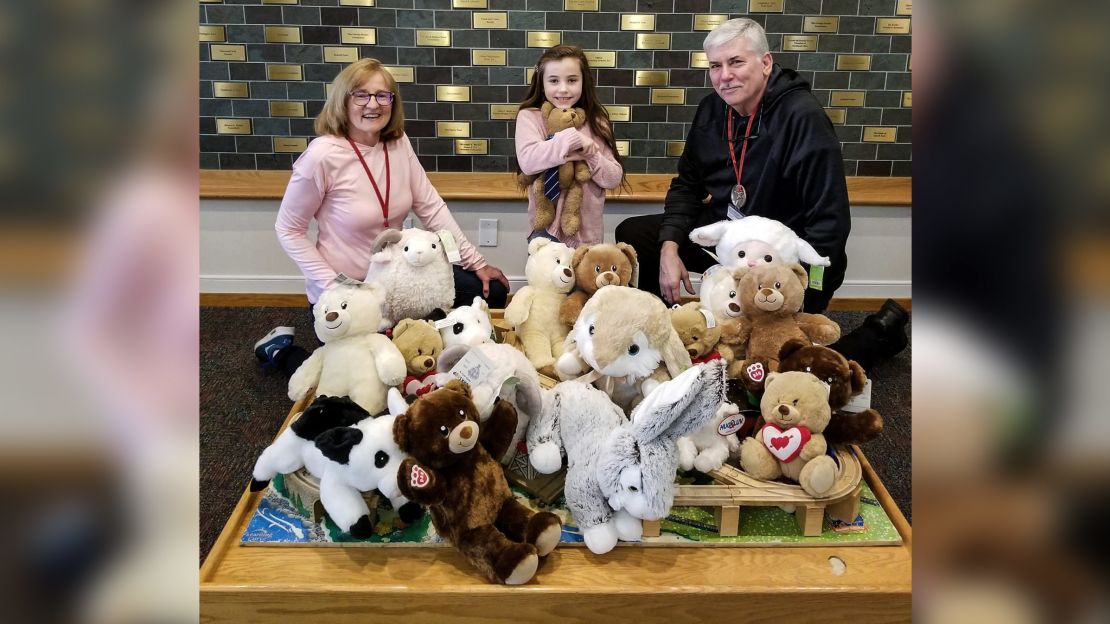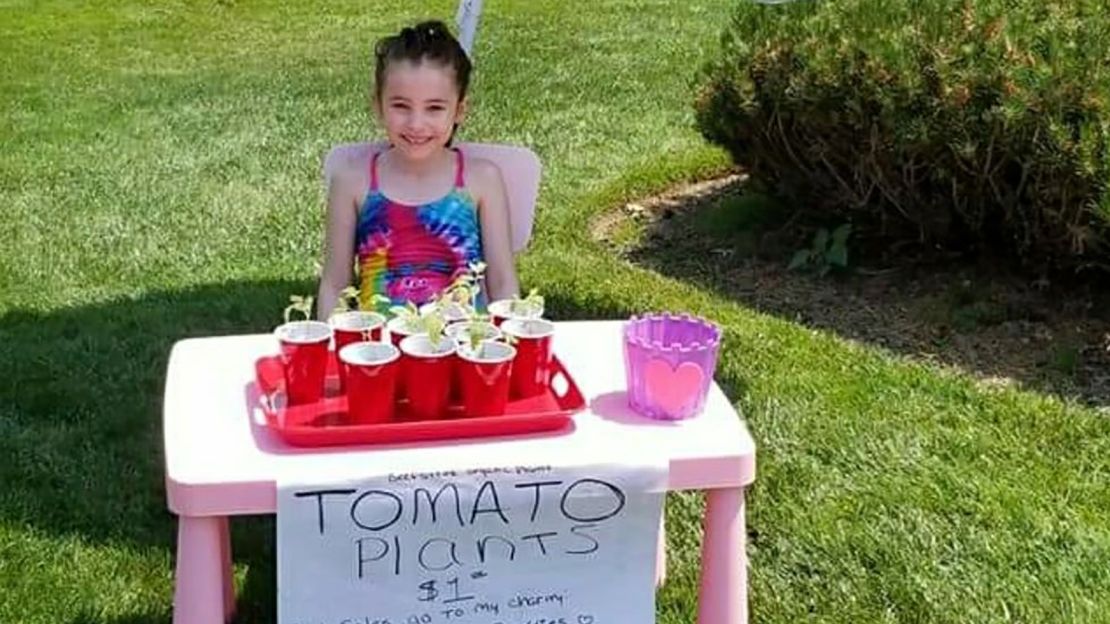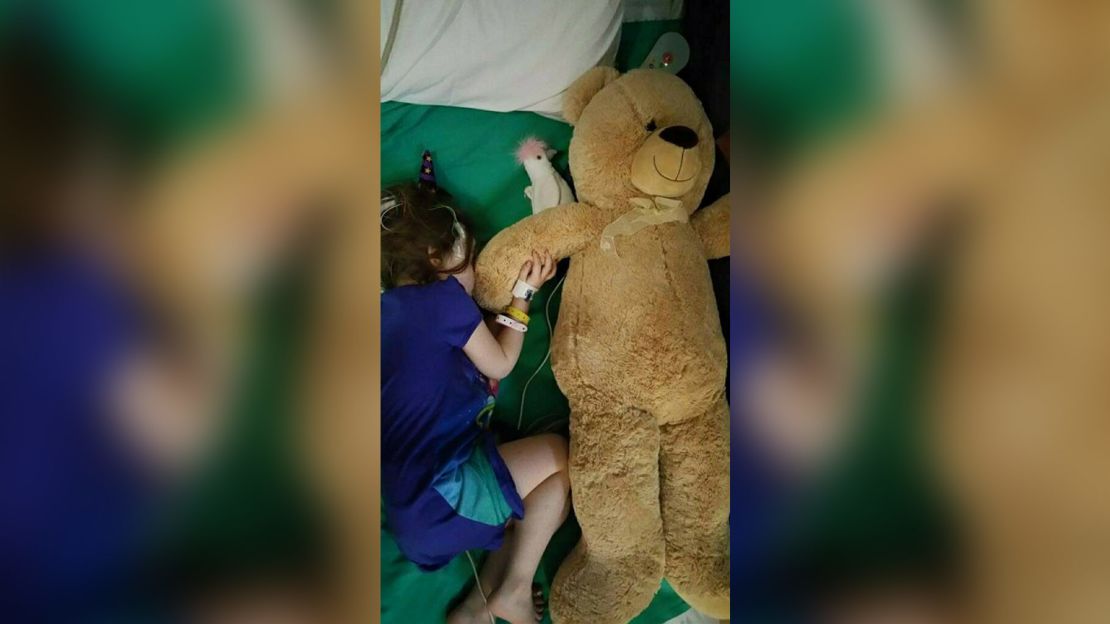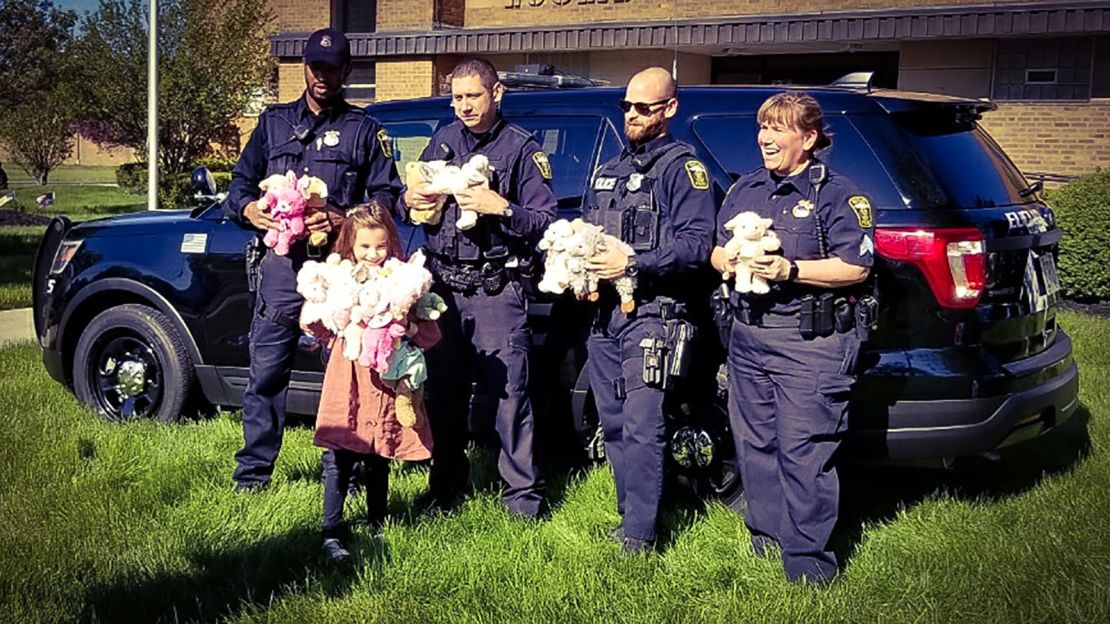Alex Walker has spent a lot of time in and out of hospital beds since she was diagnosed with epilepsy at just 11 months old.
“Her seizures were so bad, they would last over an hour, and you have to immediately call for an ambulance because she would stop breathing,” her mom, Melisa Walker, tells CNN.
Each time Alex went to the hospital, her best friend – a brown teddy bear named Sky Bear – went with her.
“He makes me feel very happy and not scared,” says Alex, 7, of the toy her dad bought before she was born.
Alex cuddles Sky Bear through doctor visits, squeezes him during shots. Nurses attach electrodes to Sky Bear to mimic what Alex is going through. Her parents bandage his head.
“She was so young and sick of sitting in a bed,” her mother recalls. “It’s the only way we could get her to get a head wrap on.”
A girl turns an observation into action
During one of her longer visits to Cleveland Clinic Children’s hospital, Alex noticed other kids didn’t have stuffed animals to cuddle.
“When we got in the car to go home, she was really quiet. Alex said she was worried about children still in the hospital,” Walker says. “She didn’t see them with their ‘friends.’”
Alex told her parents she wanted to bring her stuffed animals from home to give to other kids.

“I told her we probably couldn’t do that. Kids are sick, and the hospital won’t take used stuff,” says Alex’s mom.
She was right. Children with compromised immune systems can’t have used plush toys, which can carry germs, says Mischa Peterson, child life specialist at Cleveland Clinic Children’s.
“We don’t want to expose them to any increased risk of infection,” she says.
But the hospital would gladly accept new stuffed animals with the tags still on.
“There’s definitely a huge need for the stuffed animals – ‘comfort items,’ we call them,” Peterson says.
The hospital has lots of other toys that can be cleaned and reused, she says. But plushies are another story: Just one per patient, one use only.
“We always love when we get more because they go very quickly.”
An initial investment of $65 from a piggy bank
Alex, then 4, squirreled away her birthday dollars and other money she earned from little chores until she’d managed to save $65. Then, instead of spending it at Chuck E. Cheese’s, her favorite place, she wanted to buy teddy bears for the kids she’d left behind at the hospital.
“My heart just melted,” her mom says. “I was just overwhelmed by her wanting to do that at such a young age.”
She only delivered 13 bears on her first return to the hospital, Walker says, in some cases directly to children’s bedsides.
“You’d think she’d say, ‘Here’s a bear – bye!’ like a 4-year-old,” her mom recalls. “But she would talk to them.”

“I always tell them to just cuddle them and you won’t be scared anymore,” Alex tells CNN.
The other children would snuggle up to their plushies right away, get very quiet and say thank you, Walker recalls.
“And you back slowly out of the room,” she says.
A 20-year-old patient – children’s wards aren’t just for the very young – once saw Alex handing out bears and started to cry, then asked for one, too, Walker recalls.
“She still wanted (the) comfort of having something soft and cuddly to lay in bed with her,” Alex’s mom says.
“They provide support not just for kids but patients of all ages. They normalize the environment,” Peterson says. “That’s usually the first and biggest stressor, just a new environment – medical equipment everywhere, doctors.”

Since that day three years ago, Alex has managed to buy 400 plush toys, many of them bears but also “bunny rabbits, pigs – I like to give all different kinds,” the girl says. She paid for the stock with donations solicited by word of mouth and proceeds from tomato plants she grew and sold.
Once a month, Alex and her mom deliver them to a local Ronald McDonald House, Cleveland Clinic, other area hospitals, police and fire stations, women’s shelters and foster care programs.

“So kids can have a little friend for when they’re taken from their homes in a very traumatic situation,” Walker says.
Nurses also give out the stuffed animals Alex brings as rewards when kids have been brave through a procedure.
“It’s one more thing that can help them get through pain,” Peterson says.
GoFundMe Kid Hero for June
Private by nature, the Walkers realized a year ago that they were maxing out their donor base.
“It was hard to spread the word and get people to support it,” Walker says. “We don’t have 6,000 Facebook friends.”
So they started a GoFundMe campaign called “Alex’s Fluffy Buddies For Kids.” Money trickled in until this month, when GoFundMe noticed her sweet cause and made Alex their “Kid Hero” for June. Since then, more than $16,000 has poured in.
“These donations coming in not only takes stress off of us to support what she wants to do,” Walker says. “We want her to do it as long as she wants to. I think it’s important for kids to learn to be kind to other people.”
Alex hopes to use the money to package up toys and send them to young patients who need comforting in other states, so other kids can cuddle up with their own Sky Bears when they’re hurting or must be prodded or poked by nurses and doctors.
Alex says she hopes she can make a difference, “so they’ll be very happy and not scared.”



